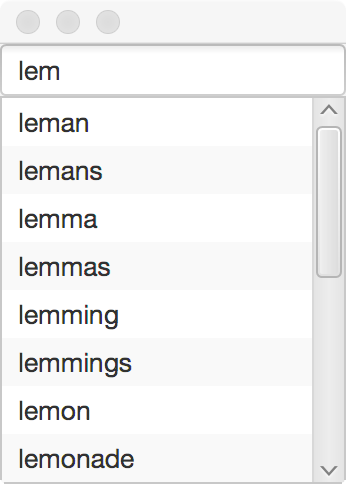CSCI 151 Lab 12: Text prediction
Overview
In this lab, we will implement a trie for storing strings and use it to predict words as they are being typed.
Setup
- Download the skeleton for this project.
Description
Modern smartphones include keyboard assistants that will suggest words while you are typing. There are many data structures that can be used to assist in this interaction, to predict the remainder of words, and autocorrect typed words. One such data structure is a trie, which divides the words into their component characters, and then stores the words in such a way that words with a shared prefix share a part of the tree.
There are two main components to the model found in the skeleton project: a Trie to store the tree of strings, and a SortedArrayMap to map characters to child Tries. SortedArrayMap in turn is implemented in terms of a SortedArray class.

You will only have to write code in the Trie class, but you will need to also look at the other classes to see what methods are available. Methods that remain to be implemented in the Trie class have been marked with TODO for easy identification.
Step 1 (D)
Implement the size method. It should essentially count how many Trie nodes have isMember set to true. This can be done recursively:
- If
isMemberistrue, count 1. - Add up the result of calling
sizerecursively on all children.
To iterate over all children, you can use a foreach loop, which depends on the iterator() method from SortedArrayMap.
We actually wrote this method together in class:
public int size() {
int count = 0;
if (isMember) {
count++;
}
for (Association<Character, Trie> assoc : children) {
count += assoc.getValue().size();
}
return count;
}Step 2 (C)
getChildWithis not recursive. It just gets the child corresponding to a given letter one level down, or returnsnullif no child corresponds to that letter. This method is just for convenience and will be reused in other methods.findis another helper method you may find useful later. It follows an entireStringthrough the trie, taking one step down per character, and returns theTrieit ends up at, ornullif none is found. It does not matter whetherisMemberis set or not.You probably want to implement
findrecursively. The recursive structure should be something like this:- Is the input string
.equal("")? This is the base case. - Otherwise, get the first character with
charAt(0)and use it to look for a child indexed by that character. If the child exists, make a recursive call with the remainder of the string (substring(1)).
- Is the input string
Step 3 (B)
Implement
contains, which tests whether a given string is contained in the trie (note “contained” means “isMemberis set”).Implement
add, which adds a new word to the trie.Implement a simple version of
remove, which simply finds the end of the word to remove and then setsisMembertofalse. This will pass all the tests but leaves lots of uselessTrienodes lying around; see Step 5.
Step 4 (A)
Implement inorder and successorsTo. See the comments in the code for descriptions of what they should do. Coming up with a good way to organize inorder is tricky. Feel free to ask me for hints. Once you have written inorder, it is possible to write successorsTo in a concise way that reuses several previous pieces.
Step 5 (100)
For a grade of 100 on the lab, implement a better version of remove, which actually deletes any unneeded Trie nodes.